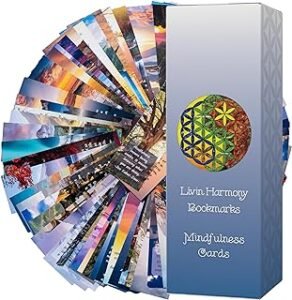Disclosure: As an Amazon Associate, I earn from qualifying purchases at no additional cost to you.
Are you looking to find peace and tranquility in your hectic life? The practice of mindfulness and meditation can lead you in right direction. In today’s fast-paced world, it’s easy to become overwhelmed and stressed. However, by embracing mindfulness and meditation, you can tap into the power of the present moment and cultivate inner peace. By focusing on your breath and being fully present in the here and now, you can quiet your mind and experience a sense of calm like never before. So, take a moment for yourself and discover how mindfulness and meditation can transform your life.
Understanding Mindfulness
Definition
Mindfulness is the practice of fully engaging in the present moment and bringing your attention to your thoughts, feelings, and sensations without judgment. It involves intentionally observing your experiences without getting caught up in them or trying to change them. It is about being fully aware of the present moment and accepting it without attachment or resistance.
Benefits
Practicing mindfulness has numerous benefits for your overall well-being. It can help reduce stress, improve mental clarity and focus, enhance emotional resilience, and promote a sense of inner peace and contentment. Mindfulness has also been shown to improve physical health, lower blood pressure, and boost the immune system. Additionally, it can improve relationships, increase empathy and compassion, and promote a greater sense of connection with others.
Principles
There are several principles that underpin the practice of mindfulness. First, it involves non-judgment, which means observing your thoughts, emotions, and sensations without labeling them as good or bad. Second, it involves acceptance, acknowledging and embracing your present moment experience without trying to change it or resist it. Third, mindfulness involves non-attachment, letting go of any desire for things to be different and allowing things to unfold naturally. Finally, it involves beginner’s mind, approaching each moment with a sense of curiosity and openness, as if experiencing it for the first time.
Exploring Meditation
Different types of meditation
Meditation is a practice that helps cultivate mindfulness and involves directing and focusing your attention. There are several different types of meditation, each with its own approach and benefits. Mindfulness meditation involves sitting quietly and observing your breath, bodily sensations, thoughts, and emotions as they arise. Loving-kindness meditation focuses on cultivating feelings of love, kindness, and compassion towards oneself and others. Transcendental meditation uses a repeating mantra to quiet the mind and induce a state of deep relaxation. Other forms of meditation include walking meditation, body scan meditation, and guided visualization.
Benefits of meditation
Meditation has numerous physical, mental, and emotional benefits. It can help reduce stress and anxiety, improve concentration and focus, enhance emotional well-being, and promote feelings of calm and relaxation. Regular meditation practice has also been shown to improve creativity, increase self-awareness, and promote positive relationships. Additionally, meditation can strengthen the immune system, lower blood pressure, and improve sleep quality. Overall, meditation is a powerful tool for cultivating a sense of inner peace and well-being.
How to start a meditation practice
Starting a meditation practice doesn’t have to be intimidating or complicated. Here are some simple steps to get started:
- Find a quiet and comfortable space where you won’t be disturbed.
- Choose a meditation technique that resonates with you, such as mindfulness or loving-kindness meditation.
- Set a specific time each day for your practice. Start with just a few minutes and gradually increase the duration as you become more comfortable.
- Sit in a comfortable position with your back straight and relaxed.
- Close your eyes or soften your gaze and bring your attention to your chosen meditation object, whether it’s your breath, a mantra, or a visual image.
- As thoughts, sensations, or emotions arise, simply observe them without judgment and gently bring your attention back to your chosen object of focus.
- Practice regularly, ideally daily, to experience the full benefits of meditation.
The Connection between Mindfulness and Meditation
Similarities and differences
While mindfulness and meditation are closely related, there are some key differences between the two. Mindfulness is a state of being fully present and aware in the moment, whereas meditation is a specific practice or technique that helps cultivate mindfulness. Mindfulness can be practiced informally throughout the day by bringing attention to everyday activities, while meditation typically involves setting aside dedicated time to focus on cultivating mindfulness. Both mindfulness and meditation, however, involve intentionally directing and focusing your attention.
How mindfulness enhances meditation
Practicing mindfulness can enhance your meditation practice by deepening your ability to be fully present and attentive. Mindfulness helps you develop the skill of non-judgmental awareness, allowing you to observe your thoughts, emotions, and sensations without getting caught up in them. By cultivating mindfulness, you can better navigate distractions, reduce mental chatter, and experience a greater sense of clarity and calm during meditation.
How meditation enhances mindfulness
On the other hand, meditation enhances mindfulness by providing a structured environment and specific techniques to cultivate and strengthen the quality of awareness. Through regular meditation practice, you develop the ability to sustain attention, increase self-awareness, and deepen your capacity for presence. Meditation acts as a training ground for mindfulness, helping you to carry the benefits of focused attention and non-judgmental awareness into your daily life.
Practicing Mindfulness in Daily Life
Mindful eating
Mindful eating involves bringing your full attention and awareness to the process of eating. It involves savoring each bite, noticing the taste, texture, and smell of the food, and eating slowly and consciously. Mindful eating helps cultivate a deeper connection with your body and natural hunger cues, promotes healthier food choices, and can reduce overeating or emotional eating.
Mindful walking
Mindful walking is a practice of bringing mindfulness to the act of walking. Instead of being lost in thought, you focus on the physical sensations of walking – the feel of your feet striking the ground, the movement of your body, and the sensations in your legs. Mindful walking can be done anywhere, whether it’s a leisurely stroll in nature or walking to work. It helps bring your attention to the present moment, increases appreciation for your surroundings, and can be a form of moving meditation.
Mindful breathing
Mindful breathing is a simple yet powerful practice of bringing awareness to your breath. It involves observing the sensation of the breath entering and leaving your body, without trying to control or manipulate it. Mindful breathing can be done anywhere, at any time, and serves as an anchor to the present moment. It helps calm the mind, reduce stress and anxiety, and promotes a sense of relaxation and clarity.
Deepening Your Meditation Practice
Setting a meditation routine
To deepen your meditation practice, it can be helpful to establish a regular routine. Set aside a specific time each day that works for you, whether it’s in the morning, during a lunch break, or in the evening. Consistency is key, so aim to meditate at the same time each day. Create a dedicated space for meditation, free from distractions, where you can sit comfortably. Consider using a timer to set the duration of your practice, gradually increasing the time as you become more comfortable. Having a routine helps cultivate a habit and makes it easier to integrate meditation into your daily life.
Guided vs. silent meditation
Both guided and silent meditation have their benefits, and it’s a matter of personal preference. Guided meditation involves listening to an instructor or recorded audio guiding you through the practice, providing instructions and prompts for contemplation. It can be helpful, especially for beginners, to have guidance and support. Silent meditation, on the other hand, involves meditating in silence, without any external instructions or guidance. It allows for a deeper sense of internal focus and self-discovery. Experiment with both guided and silent meditation to find what works best for you.
Dealing with common challenges
It’s common to face challenges when starting or deepening a meditation practice. Restlessness, difficulty focusing, and a busy mind are normal experiences. Instead of trying to push these challenges away or become frustrated, approach them with curiosity and acceptance. Remember that the practice of meditation is not about achieving a perfectly clear mind, but rather about observing whatever arises with an open and non-judgmental attitude. If you find it challenging to meditate alone, consider joining a meditation group or seeking guidance from a meditation teacher.
Integrating Mindfulness and Meditation into Stress Management
Reducing stress levels
Mindfulness and meditation can be highly effective tools for reducing stress. By practicing mindfulness, you learn to notice and respond to stressors in a more calm and centered way. Meditation allows you to cultivate a sense of inner peace and relaxation, helping to counteract the physiological effects of stress. Through regular practice, you can develop a greater awareness of stress triggers and learn to respond to them with greater resilience and equanimity.
Coping with anxiety
Anxiety can be overwhelming and debilitating, but mindfulness and meditation offer powerful techniques for managing anxiety. By bringing your attention to the present moment, you can calm your anxious thoughts and fears. Meditation helps regulate the nervous system, activates the relaxation response, and cultivates a sense of being grounded and stability. Mindfulness also helps you develop a more compassionate and accepting attitude towards your anxiety, reducing resistance and allowing for greater healing and transformation.
Improving sleep quality
Mindfulness and meditation can significantly improve the quality of your sleep. By practicing mindfulness before bed, you can quiet the mind and create a sense of relaxation, making it easier to fall asleep. Meditation helps reduce rumination and racing thoughts, allowing you to enter a state of deep restfulness. Regular mindfulness and meditation practice can also help regulate sleep patterns, promote a healthier sleep-wake cycle, and reduce insomnia or sleep disturbances.
Building Emotional Resilience through Mindfulness
Recognizing and accepting emotions
Mindfulness helps you develop the ability to recognize and accept your emotions without judgment. By paying attention to your emotions in the present moment, you can better understand their causes and respond to them with greater wisdom and compassion. Mindfulness allows you to create a gap between your emotions and your reactions, enabling you to choose how you respond to challenging situations.
Using mindfulness to regulate emotions
Through mindfulness, you can learn to regulate and manage your emotions effectively. By observing your emotions without attachment or aversion, you can prevent them from overpowering you and make more skillful choices in how you respond. Additionally, mindfulness allows you to develop a greater sense of self-awareness, helping you identify triggers and patterns of emotional reactivity. By cultivating a sense of inner calm and groundedness, you can navigate difficult emotions with greater resilience and equanimity.
Cultivating compassion towards self and others
Mindfulness is intrinsically linked to the development of compassion towards oneself and others. By practicing non-judgmental awareness, you can let go of self-criticism and cultivate self-acceptance and self-compassion. Mindfulness also helps you develop empathy and understanding towards others, enhancing your relationships and fostering a greater sense of connection and kindness. By embodying compassion, you can cultivate emotional resilience and contribute to a more compassionate world.
Mindfulness and Meditation for Self-Reflection
Developing self-awareness
Mindfulness practices provide an opportunity for deep self-reflection and self-awareness. By bringing attention to your thoughts, emotions, and sensations, you can gain insight into your patterns, beliefs, and behaviors. Mindfulness allows you to observe yourself with curiosity and non-judgment, fostering a greater understanding of who you are and how you relate to the world. Through self-awareness, you can make conscious choices and align your actions with your values and intentions.
Exploring personal values
Mindfulness and meditation provide a space for exploring and clarifying your personal values. By connecting with your inner wisdom and inner guidance, you can identify what truly matters to you and align your life with those values. Mindfulness allows you to step back from the noise and distractions of everyday life and tune into what is essential and meaningful. By living in alignment with your values, you can experience a greater sense of fulfillment and purpose.
Finding clarity in decision-making
Mindfulness and meditation can help you cultivate clarity and discernment in decision-making. By practicing non-attachment and creating space for quiet contemplation, you can connect with your intuition and inner knowing. Mindfulness allows you to observe your thoughts and emotions without getting caught up in them, giving you a greater perspective and insight. Through this clarity, you can make decisions that align with your values and aspirations, leading to greater personal and professional fulfillment.
Mindfulness and Meditation in Relationships
Enhancing communication and empathy
Mindfulness and meditation can greatly enhance communication and empathy in relationships. By cultivating mindfulness, you can develop the skill of deep listening and non-reactivity, allowing for more effective and compassionate communication. Meditation helps cultivate a sense of presence and attunement, allowing you to be fully present with others and understand their perspectives. By practicing mindfulness in relationships, you can create a space of mutual respect, trust, and understanding.
Managing conflict mindfully
Conflict is an inevitable part of any relationship, but mindfulness and meditation can help navigate conflicts with grace and presence. By practicing mindfulness during challenging conversations or conflicts, you can cultivate a sense of calm and non-reactivity. Mindfulness allows you to step back and observe your own reactions and emotions, enabling you to respond more skillfully rather than reacting from a place of anger or defensiveness. By approaching conflict mindfully, you can find creative solutions, deepen connections, and foster growth and healing in relationships.
Cultivating gratitude in relationships
Mindfulness and meditation can deepen your capacity for gratitude and appreciation in relationships. By bringing mindful awareness to the present moment, you can fully savor and appreciate the positive aspects of your relationships. Meditation cultivates a sense of gratitude by focusing on the qualities and experiences that you appreciate in others. By expressing gratitude and appreciation, you can strengthen your relationships and create a positive and uplifting environment.
The Science behind Mindfulness and Meditation
Neurological effects
Scientific research has shown that mindfulness and meditation have significant effects on the brain and the nervous system. Regular mindfulness and meditation practice can lead to structural and functional changes in the brain, such as increased gray matter in regions associated with attention, emotion regulation, and empathy. Meditation has been found to activate the parasympathetic nervous system, which promotes relaxation and counteracts the effects of chronic stress. Neurological studies also suggest that mindfulness and meditation can enhance cognitive functioning, memory, and decision-making abilities.
Psychological studies
Psychological studies have demonstrated the positive effects of mindfulness and meditation on mental health and well-being. Research has shown that mindfulness-based interventions can reduce symptoms of depression, anxiety, and stress. Mindfulness has also been found to improve emotional regulation, increase self-compassion, and enhance overall psychological resilience. Studies have shown that regular meditation practice can improve attention and concentration, boost creativity, and promote emotional intelligence.
Mindfulness-based therapies
The benefits of mindfulness and meditation have led to the development of various mindfulness-based therapies. Mindfulness-based stress reduction (MBSR) and mindfulness-based cognitive therapy (MBCT) have been extensively studied and found to be effective in treating a range of mental health conditions, such as depression, anxiety, and chronic pain. These therapies involve a combination of mindfulness meditation, psychoeducation, and cognitive-behavioral techniques. Mindfulness-based approaches have also been incorporated into other therapeutic modalities, such as dialectical behavior therapy (DBT) and acceptance and commitment therapy (ACT).
In conclusion, mindfulness and meditation are powerful practices that can help cultivate inner peace, enhance well-being, and promote personal growth. By understanding and incorporating mindfulness and meditation into your daily life, you can experience the numerous benefits they offer in various aspects of your life, from reducing stress and improving relationships to enhancing self-awareness and emotional resilience. With regular practice and dedication, you can cultivate a sense of deep inner peace and flourish in all areas of your life.
Meditation Tools:
***Disclosure: Health Fitness Nova (HealthFitnessNova.com) is a participant in the Amazon Services LLC Associates Program, an affiliate advertising program designed to provide a way for websites to earn advertising revenues by advertising and linking to [Amazon.com or .ca, .co.uk, etc.]




